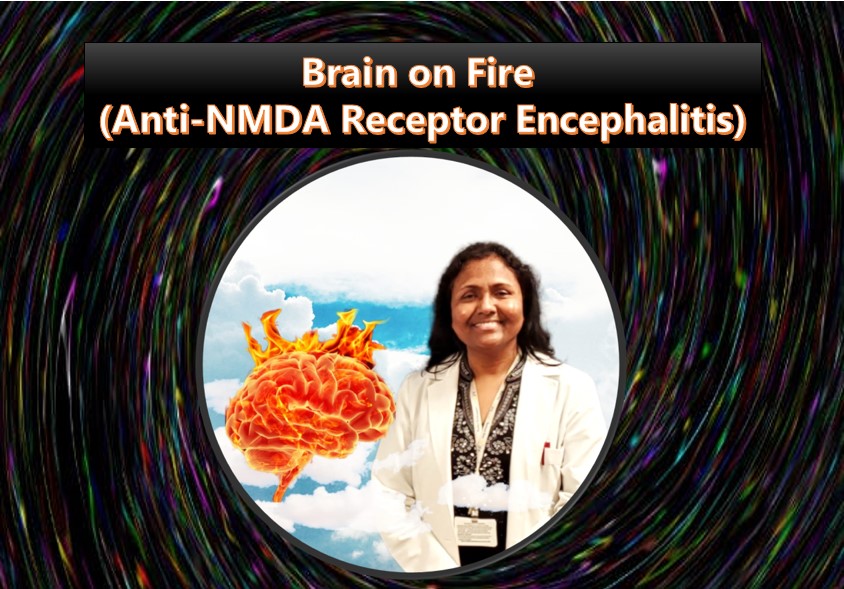
Click here to read the article in Marathi: रहस्यभेद!
This is the story of one of my patients whom I treated nine years ago. It was not well recognized at that time and was used to be considered a rare condition. Many times, patients would be given the psychiatric diagnosis. The name of the condition is anti-NMDA receptor encephalitis, means inflammation of the brain. In short, brain on fire!
The movie “Brain on fire” is based on the real story of Susannah Cahalan, who was 24 when she suddenly developed this condition. She wrote about her experience in the best-selling book “Brain on Fire: A Month of Madness.” Despite $1 million worth of blood tests and brain scans, it wasn’t until a physician thought to test for this condition that she got a correct diagnosis. Susannah is now a reporter at the New York Post. I came to know about this movie and book recently. This movie reminded me of my patient and decided to share the story with you.

My patient was a 17 years old, healthy girl. She presented to our hospital with two seizures one month apart, and we started her on seizure medication. Later, her parents started noticing that her behaviors are changing. She was in the college application process, and her parents thought she is behaving differently due to stress. But, it continued worsening. She had confused thinking, some odd behaviors and started showing memory deficits. It was thought to be a psychiatric disorder, and she was admitted to a psychiatric hospital. During her stay there, she was noted to have some bizarre behaviors. One day, she asked her mother to cook and bring her favorite food. Her mother cooked all her favorite food and took it to the hospital. Mother and daughter had fun eating food and talking, laughing for almost two hours. The next day, when she saw her mother, she started getting angry and blaming her for not loving her. That is why she did not cook and bring her favorite food yet. Mother tried to remind her that she got the food, and they both had a great time together the day before. But, she denied it and kept on arguing with her mother. Similar incidents kept on happening. She was not showing any reasonable response to psychiatric treatment. Then, she was transferred to our hospital for neurological evaluation. She was admitted, and we ran all possible tests on her, including CT scan/brain MRI, lots of blood tests, brain wave study (EEG), brain fluid (Cerebro Spinal Fluid) tests. All her tests came as normal. We discharged her home.
We were puzzled. I could not stop thinking about her and started looking into the literature. I came across the condition called Anti-NMDA Receptor Encephalitis. I felt that she could fit into that diagnosis. We ordered tests to check antibodies for it. After few weeks, we received the test results, and she tested positive for that condition.
Let us see what Anti-NMDA Receptor Encephalitis is. NMDA receptors are proteins that control electrical impulses in the brain. All healthy individuals produce antibodies against viruses, bacteria, or tumors. Our body usually does not produce antibodies against our tissues. But in some individuals, antibodies are produced against their tissues. In this condition, antibodies are produced against their NMDA receptors and cause inflammation of the brain. The role of the tumor in producing Anti-NMDA receptor encephalitis is not fully known. What is known that most tumors associated with anti-NMDA receptor encephalitis contain neural tissue (tissue containing cells identical to that found in the brain), and NMDA receptors. It is presumed that antibodies are initially formed against NMDA receptors found within tumors and then attack similar-looking receptors in the brain producing the symptoms and signs associated with anti-NMDA receptor encephalitis. Tumor removal is a vital part of treatment. In boys, tumors are found in testes. The tumor is not present in every case of Anti-NMDA Receptor Encephalitis. In cases not associated with a tumor, it is not known what causes anti-NMDA receptor encephalitis.
We brought her back to the hospital. As this condition sometimes is associated with a tumor, we got the CT scan of her ovaries. She found to have a tumor of the ovary on one side, which is called an ovarian teratoma. We treated her with immunoglobulin therapy. Later on, she underwent surgery to remove a tumor. She recovered completely.

All your posts r very interesting n thrilling. Love to read all. Keep posting.
Thank you, dear Aarti 🙂